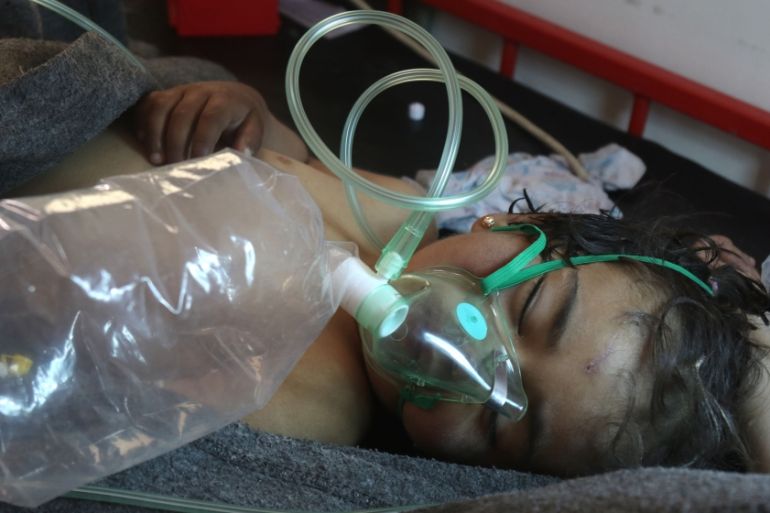Syria condemns ‘misleading’ chemical arms watchdog report
EU mulls expanding sanctions on Damascus, following report blaming Syrian government for toxic attacks in 2017.

The Syrian government has condemned a report by the global chemical weapons watchdog blaming President Bashar al-Assad’s forces for a series of toxic gas attacks in 2017, even as the European Union welcomed the findings and said it was willing to mull expanding sanctions against Damascus.
In a statement on Thursday, the Syrian Ministry of Foreign Affairs called the report of the Organisation for the Prohibition of Chemical Weapons (OPCW) “misleading”, saying it contained “falsified and fabricated conclusions aimed at falsifying truths and accusing the Syrian government”.
Keep reading
list of 3 itemsUN: ‘Highly probable’ Syria gov’t and allies attacked hospitals
Syrian forces ‘used nerve gas’ in four attacks
Wednesday’s report, the first by a new investigative team set up by the OPCW, concluded that poisonous chlorine and sarin nerve gas was thrown over the town of Latamneh in the country’s western Hama region at least three times in March 2017.
It said two Syrian Arab Air Force Sukhoi SU-22 jet fighters dropped two bombs containing sarin on Latamneh on March 24 and March 30, 2017.
A Syrian military helicopter dropped a cylinder containing chlorine on a hospital in the same town on March 25 that year, the report said.
The OPCW said it could not identify the precise chain of command, but that orders for the attacks must have come from senior Syrian government commanders.
Damascus insists it has handed over its weapons stockpiles under a 2013 agreement, prompted by a suspected sarin gas attack that killed 1,400 people in the Damascus suburb of Ghouta.
Damascus “absolutely denies ever having used poisonous gases in the town of Latamneh or in any other Syrian city or village,” the Syrian foreign ministry said.
EU, Turkey welcome report
Separately on Thursday, the EU’s diplomatic chief Josep Borrell welcomed the report on behalf of the 27 members of the bloc.
“We fully support the report’s findings and note with great concern its conclusions,” he said. “Those identified responsible for the use of chemical weapons must be held accountable for these reprehensible acts.”
The report will now go to the United Nations among others to decide what further action – if any – should be taken.
“It is now up to the Executive Council and the Conference of the States Parties to the Chemical Weapons Convention, the United Nations Secretary-General, and the international community as a whole to take any further action they deem appropriate and necessary,” Fernando Arias, the watchdog’s director-general, said.
Borrell said the EU was willing to consider expanding its sanctions against al-Assad’s government.
“The European Union has previously imposed restrictive measures on high-level Syrian officials and scientists for their role in the development and use of chemical weapons and is ready to consider introducing further measures as appropriate,” he said in a statement.
Turkey also welcomed the report, saying it was an “important step” to ensure the accountability of the perpetrators of chemical weapons attacks in Syria.
“The [Syrian] regime, which has murdered its own citizens for nine years … should be [held] accountable,” the Turkish foreign ministry said in a statement on Thursday.
Western states, the Syrian opposition and human rights groups have all accused al-Assad’s forces of causing numerous deaths in several chemical weapons attacks over the course of Syria’s nine-year
war.
Al-Assad’s government and its main backer, Russia, has consistently rejected such accusations.